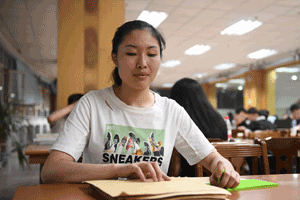SAR urged to accept top legislature's authority to interpret Basic Law
 |
|
The LegCo oath fiasco last year has triggered an interpretation of the Basic Law by the National People’s Congress Standing Committee. The country’s top legislature has the lawful authority to exercise interpretations of the Basic Law, former chief secretary for administration Henry Tang Ying-yen says. Hong Kong people, including legal professionals, should understand that the top legislature will not exercise an interpretation without good reason. Justin Chin / Bloomberg |
Former chief secretary for administration Henry Tang Ying-yen believes Hong Kong people, including the legal profession, must accept that the country's top legislature has the lawful authority to exercise interpretations of the Basic Law, and that there was a need to interpret the Basic Law on each occasion.
Since the handover in 1997, the National People's Congress Standing Committee (NPCSC) has interpreted provisions of the Basic Law on five occasions.
"The Basic Law has clearly spelt out that the NPCSC has the power to interpret the Basic Law and the NPCSC will not exercise an interpretation without reasons," he said.
"We have seen five interpretations of Basic Law provisions since 1997 and each interpretation was justified. They include interpretations related to the right of abode case in 1999, the term of office of the Chief Executive in 2005 and the Congo case in 2011 because it involved foreign affairs," he explained.
In a recent newspaper interview Andrew Li Kwok-nang, former chief justice of the Court of Final Appeal, said the latest interpretation of Basic Law Article 104 related to oaths and disqualification of certain Legislative Council members last year yielded a negative public impression on judicial independence in Hong Kong. This is because it occurred before the court ruling.
Tang disagreed but said he understood why the former chief justice made such comments.
He said: "For the case of LegCo oath fiasco, the timing of interpretation of Basic Law Article 104 before the ruling was appropriate. If the interpretation took place after the ruling and the ruling happened to be inconsistent with the interpretation, people would grumble that the interpretation in effect overturned the court verdict."
Tang, however, admitted the interpretation on the right-of-abode case in 1999 was highly controversial because it was the very first time the NPCSC interpreted Basic Law provisions. It happened after the Court of Final Appeal had handed down a ruling.
joseph@chinadailyhk.com
- Dalian center gives hope to women, new life to embryos
- China holds inter-provincial disaster relief drill
- 20 years prove success of 'one country, two systems': official
- Backgrounder: What are supercomputers?
- China's two supercomputers still world's fastest as US squeezed out of 3rd place

























